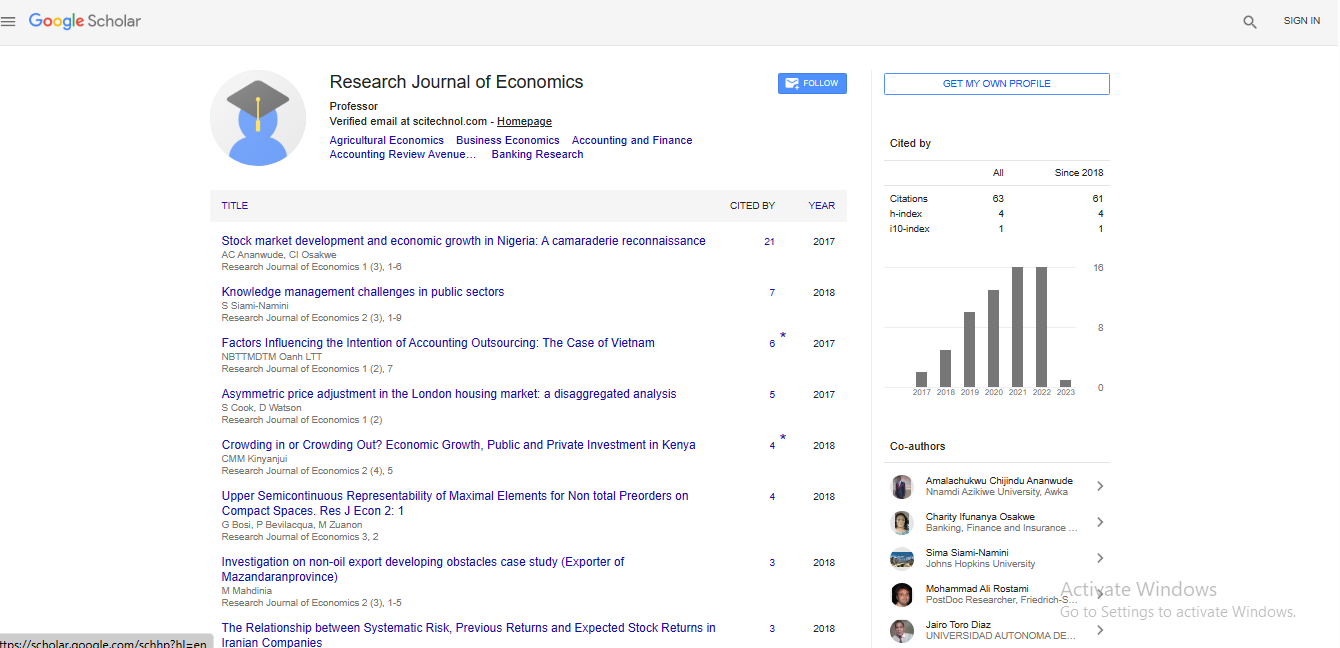Short Communication, Res J Econ Vol: 7 Issue: 4
Agricultural Economics: Understanding the Global Perspectives and Sustainability
Richard Storm*
1Department of Agricultural and Resource Economics, University of California- Davis, Davis, United States of America
*Corresponding Author: Richard Storm,
Department of Agricultural and Resource
Economics, University of California-Davis, Davis, United States of America
E-mail: stormr@ucdavis.edu
Received date: 28 June, 2023, Manuscript No. RJE-23-113052;
Editor assigned date: 30 June, 2023, PreQC No. RJE-23-113052 (PQ);
Reviewed date: 14 July, 2023, QC No. RJE-23-113052;
Revised date: 21 July, 2023, Manuscript No. RJE-23-113052 (R);
Published date: 28 July, 2023, DOI: 10.4172/RJE.1000155
Citation: Storm R (2023) Agricultural Economics: Understanding the Global Perspectives and Sustainability. Res J Econ 7:4.
Description
Agricultural economics is a multidisciplinary field that examines the economic aspects of agricultural production, distribution, and consumption [1]. It encompasses the application of economic principles to agricultural systems, with the aim of optimizing resource allocation and improving the well-being of farmers, consumers, and society at large. Agricultural economics extends beyond domestic production to encompass international trade, market dynamics, and policy considerations [2]. Agricultural economics on a global scale involves the study of trade relationships, market integration, and the impact of policy decisions on international agricultural markets.
Farmers make decisions regarding crop selection, input usage, and production methods based on profitability and market demand [3]. Limited resources such as land, labor, and capital are allocated efficiently to maximize output and profit. The interaction between agricultural supply and consumer demand determines prices for agricultural products. Factors like information asymmetry, transportation costs, and market power can affect price formation and distribution. Agricultural economics addresses sustainable resource management to ensure long-term productivity and environmental preservation. Agricultural activities can have positive or negative external impacts on the environment, which need to be considered in economic analysis.
Agricultural economics plays a role in ensuring equitable access to affordable and nutritious food for all [4-7]. It examines how agricultural activities impact rural economies and communities, focusing on poverty alleviation and rural development. Developing economies often undergo agricultural transformation as they shift from subsistence to commercial production. Developing countries participate in global value chains, producing intermediate goods for global markets [8]. Agricultural economics examines the integration of global markets and the transmission of price signals across countries. Analyzing the entire value chain of agricultural products, from production to consumption. Tariffs and import quotas impact the flow of agricultural goods across borders, influencing prices and trade volumes [9]. Bilateral and multilateral trade agreements aim to reduce trade barriers and promote market access. Countries specialize in producing specific agricultural goods for export, while importing those that are more efficiently produced elsewhere. Agricultural trade can impact a country's trade balance, affecting its overall economic health.
Challenges in agricultural economics
Changing weather patterns and extreme events pose challenges for predicting crop yields and adapting production strategies. Fluctuating commodity prices can impact farmers' incomes and food affordability. Agricultural economics addresses international trade policies and their impact on domestic agriculture. Governments use subsidies and price supports to stabilize agricultural markets and support farmers' incomes [10]. Agricultural economics assesses trade policies that influence the flow of agricultural goods across borders. Some countries provide subsidies to their agricultural exports, influencing global prices and trade dynamics. Balancing domestic food security with international trade is a complex challenge for policymakers.
Future trends and sustainable agriculture
Emphasizing ecological principles in farming practices for sustainable resource use. Leveraging technology and data for efficient resource management and decision-making. Technology-driven practices optimize resource use through data collection and analysis. Agricultural economics evaluates the economic implications of Genetically Modified Organisms (GMOs) and biotechnology
Conclusion
Agricultural economics is vital for understanding the economic dynamics of agricultural systems and their broader impact on society, the environment, and food security. By addressing resource allocation, sustainability, and rural development, agricultural economics contributes to shaping policies, practices, and innovations that ensure a resilient and sustainable agricultural sector.
References
- Anderson JR. (1974) Simulation: methodology and application in agricultural economics. Agric Econ 42(1): 3-55.
- Just RE. (2003)Risk research in agricultural economics: opportunities and challenges for the next twenty-five years. Agric Syst 75(2-3):123-59.
- Martinho VJ. (2018) Interrelationships between renewable energy and agricultural economics: An overview. Energy Strateg Rev 22:396-409.
- Leamer EE, Levinsohn J. (1995) International trade theory: the evidence. Handb Int Econ 3:1339-94.
- Krugman PR. (1989) Industrial organization and international trade. Handb. Ind. Organ 2:1179-223.
- Ahmed FE. (2002)Detection of genetically modified organisms in foods. Trends Biotechnol 20(5):215-23.
- Balezentiene L, Streimikiene D, Balezentis T. (2013) Fuzzy decision support methodology for sustainable energy crop selection. RenewSustainEnergyRev 17:83-93.
- Tseng FH, Cho HH, Wu HT. (2019) Applying big data for intelligent agriculture-based crop selection analysis. IEEE Access 7:116965-74.
- Filippi C, Mansini R, Stevanato E. (2017) Mixed integer linear programming models for optimal crop selection. Comput Oper Res 81:26-39.
- Lichtenberg E. (2002) Agriculture and the environment. Handb Agric Econ 2:1249-313.
 Spanish
Spanish  Chinese
Chinese  Russian
Russian  German
German  French
French  Japanese
Japanese  Portuguese
Portuguese  Hindi
Hindi 